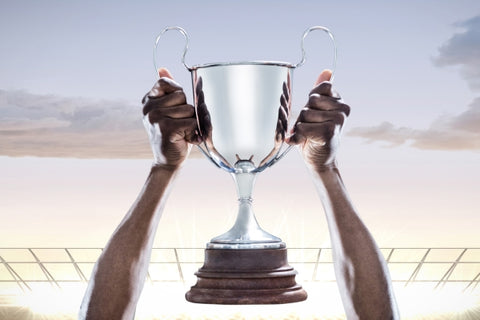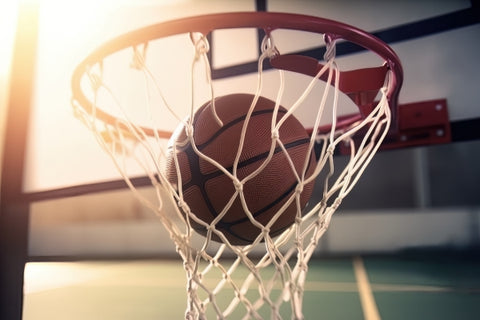It's that time of year again! The time when basketball fans from all over the country come together to celebrate one of the biggest events in sports: March Madness. This year, the NCAA tournament kicked off on March 14 and runs through April 3. If you're a fan of either professional or collegiate basketball, there's no doubt that you'll want to tune in at home or a friend's house.
In this blog post, we'll be sharing 10 of the most interesting facts about March Madness that you may not have known before. So sit back, relax, and get ready for some fun trivia!

1. The Tournament Is Older Than the NBA
The NCAA Division I men's basketball tournament, aka "March Madness," has been around since 1939. Meanwhile, the NBA's predecessor, the Basketball Association of America, didn't come into existence until 1946.
The NCAA tournament set in March was the brainchild of Wisconsinite Harold Olsen, who served as head coach of the Ohio State Buckeyes for over two decades.
In addition to leading efforts to create an NCAA postseason tournament, Olsen also helped create college basketball's "10-second rule" dictating how long a team has to get the ball over the half-court lane.
2. The Term "March Madness" Did Not Originate with the NCAA Tournament
Coincidentally, the "March Madness" phrase was first put in print in 1939 (the same year as the NCAA tournament's founding) but was initially used only to describe high school championships.
The man responsible for immortalizing the phrase was Henry "H. V." Porter, an educator and administrator who used the term "March Madness" in a 1939 essay of the same name. Porter also penned a 1942 poem, "Basketball Ides of March."
"March Madness" eventually became synonymous with the NCAA tournament thanks to CBS sportscasters of the 1980s.

3. The Original National Championship Series Initially Had Only Eight Teams
In fact, it wasn't until 1951 that a tournament was held that featured 16 teams competing for the NCAA title. That number expanded to between 22-25 teams (with 7-10 byes) in 1953.
It wasn't until 1985 that the tournament hit over 60 teams vying to claim champion status, and NCAA didn't add the 68 teams we know today until as recently as 2011!
4. Kansas City Has Hosted More "Final Four" Rounds Than Anywhere Else
Since its earliest days, the various rounds of the March Madness tournament have been held at different venues throughout the country. The top two host cities for the Final Four are Kansas City, MO (with 9 games hosted at KC's Municipal Auditorium) and New York City (with 7 games hosted at NYC's third version of the famous Madison Square Gardens venue).
However, neither of these venues has hosted a Final Four round since the 1960s. Meanwhile, Ohio's University of Dayton Arena holds the record for total number of games hosted (36!).
5. Over 90% of the NCAA's Annual Revenues Come from the CBS Broadcast of the Tournament
Since 2018, contractual arrangements have allowed every single game of the March Madness tournament to be broadcast across the entire country, albeit across different networks.
This setup has proved lucrative for the NCAA, which receives over $500 million per year just from the CBS broadcast. That money is divided amongst the NCAA's member schools based on each of their number of Division I sports, their number of scholarships awarded, and their basketball conference performance.
6. Warren Buffett Offered $1 Billion to Anyone Who Could Craft a Perfect Bracket
Bracketology has become such a fixture of American culture that celebrities and presidents have shared their broadcasts on live television and social media.
In addition, various businesses have offered boatloads of money to anyone who can perfectly predict the outcome of every game during March Madness (the odds of doing so randomly being 9.2 quintillion to 1!).
Despite Warren Buffett offering a $1 billion prize to anyone who could make the perfect bracket for the 2014 tournament, no one rose to the challenge. The closest person to reach bracket perfection so far is Gregg Nigl, whose 2019 bracket accurately predicted the first 49 games.
7. John Wooden's UCLA is the All-Time National Title Leader
With 11 titles, the UCLA Bruins men's basketball team holds the record for most NCAA Division I title game wins. This is largely thanks to legendary coach John Wooden, who led the team from 1948 to 1975 and is widely considered the greatest college basketball coach in history.
Of UCLA's almost-dozen March Madness tournament wins, 10 of those came under Coach Wooden, and seven of those championship titles came in consecutive years. As the icing on the cake, Wooden's Bruins had four undefeated seasons during his tenure, two of them back-to-back (the only school in history to do so).
8. The Final Four Scoring Record Has Been Untouched Since 1965
Given that March Madness features the best teams from each conference, it should come as no surprise that it sees a high level of scoring.
Notre Dame's Austin Carr holds the record for most points scored in any tournament game (61 points in 1970's first round of play), while Michigan's Glen Rice is the highest scorer across an entire tournament (184 points in 6 games during the 1989 tournament).
However, no player has matched the single-game Final Four performance of Princeton's Bill Bradley, who netted 58 points in the national third-place game in 1965. Despite the high level of play that continues to exist in the tournament, Bradley's nearly 60-year-old record remains untouched.
 9. Research Has Found That Cinderella Stories Predict Future NBA Success
9. Research Has Found That Cinderella Stories Predict Future NBA Success
In 2012, members of the National Bureau of Economic Research found that March Madness players who outperform expectations individually and as part of a team are likelier to experience success at the pro level.
Consequently, many college players who dazzle beyond belief during March Madness have a better chance of showing up higher in the NBA draft.
10. The "Big Dance" Nickname Comes from an Off-the-Cuff Remark
Fans of the NCAA tournament know that March Madness isn't the only nickname for the championship bracket series. It's also popularly known as the "Big Dance." What many people may now know is that this phrase comes from an impromptu remark by Marquette University's coach, Al McGuire.
During the 1977 tournament, McGuire told a reporter that he always wears a blue blazer during "the Big Dance." The Golden Eagles won their first championship game that year, and ever since then, fans have included McGuire's preferred term as one of the many nicknames for the tournament.
Wrapping Up
So there you have it – 10 fascinating facts about March Madness! Now that you know more about this year's tournament, don't forget to check out all the excitement on TV or online, and be sure to fill out a bracket while you're at it!
Good luck, and enjoy the madness!






